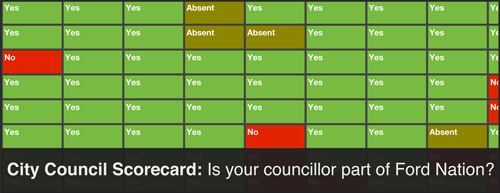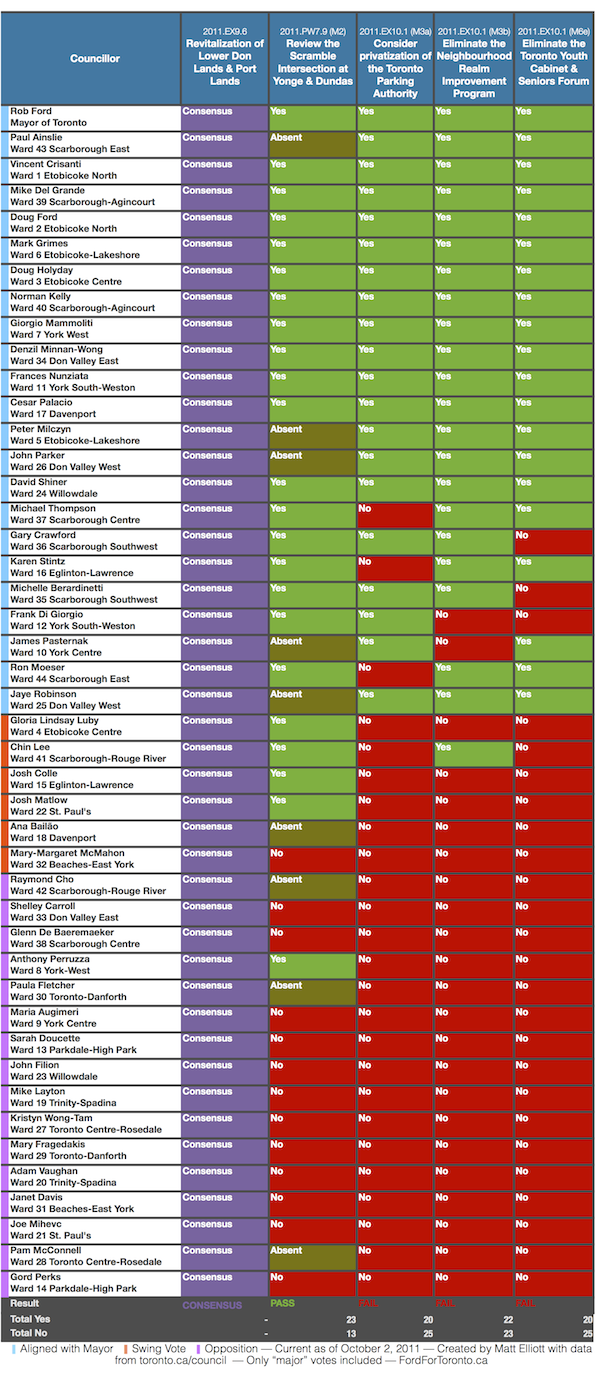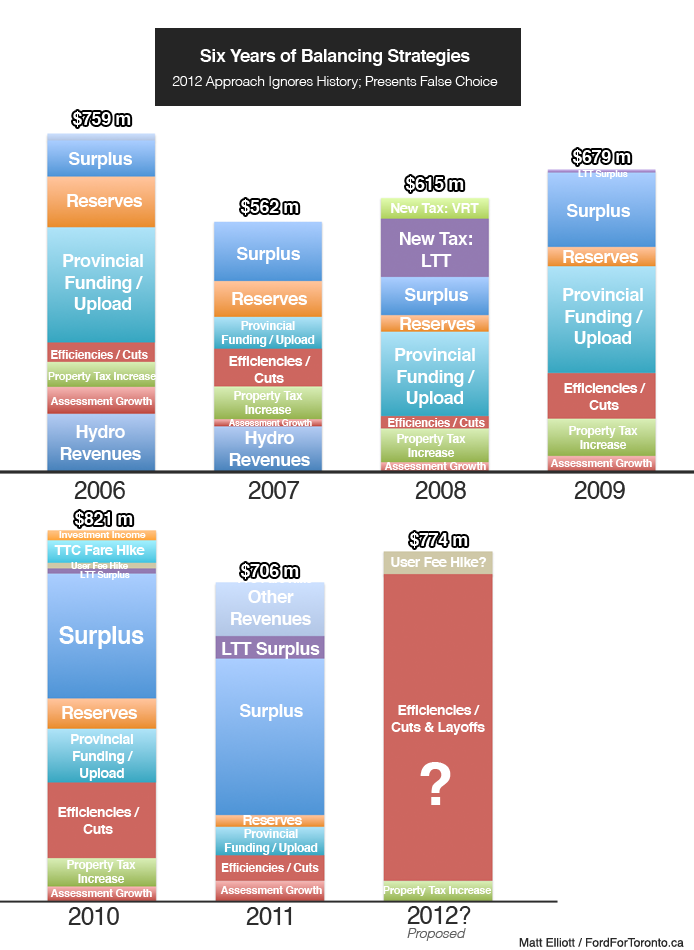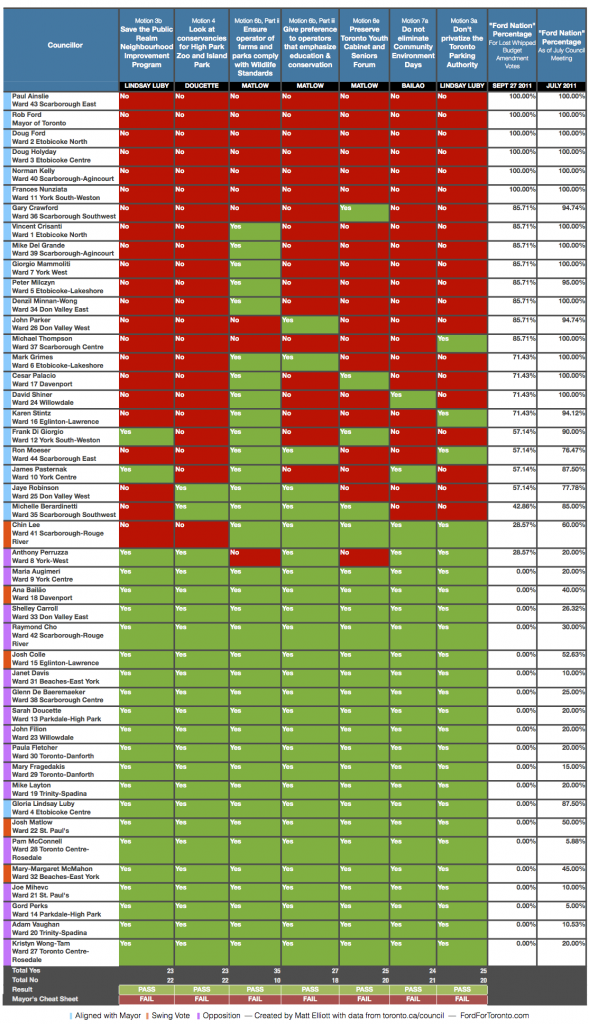Marathon Meeting 2: Electric Boogaloo is the obvious joke, or maybe Marathon Meeting 2: Judgment Day, but I kind of like Marathon Meeting 2: The Legend of Rob Ford’s Gold.
But let’s move on.
On Monday, the mayor’s executive committee held yet another marathon meeting. This one was a bit shorter, wrapping up around 5:30 a.m on Tuesday morning. And, despite continuing to build the good will I have toward the people who live in this city and the lengths they’ll go to defend the things they value, the meeting ultimately suffered from the same drawbacks that most sequels to blockbuster movies do: it felt a bit repetitive and maybe a little unnecessary.
This isn’t a knock on the hundreds of citizens who — once again — took time off work to show up and make their case for cuts. They spoke and, for the most part, effectively delivered the message that Toronto never voted for cuts to service. But, as the hours and deputations piled up, there was the sense that this setting — the executive committee – was no longer an important battleground. That, given the mayor’s maybe-declining popularity and the increased willingness of councillors to move against Ford’s once-iron grip on council, the message voiced again and again by deputants in Committee Room 1 at City Hall is already being heard.
That’s not to say that Ford is defeated or being made irrelevant. Far from it. But any fear that the Rob Ford-led administration would simply be able to steamroll through their agenda over the next three years has been effectively erased. The anger is getting to people: popularity is waning, slogans long forgotten. Political alliances are splintering — even, I’d speculate, within the executive committee itself — and tempers are flaring like never before.
The mayor relented this week. Both on the waterfront and on service cuts. That’s big.
What the executive committee approved
For the most part, the executive committee on Monday continued their pattern of being a lame duck group that continues to pass the buck and dither. There seems to be a concerted effort to drag things out in such a way that staff and consultants can shoulder the blame for any service cuts. For a mayor who ran on his purported ability to effectively and easily manage the city’s budget — buoyed by his experience watching a decade’s worth of similar budgets — the mayor has been mostly absent through this process, waiting for others to toss out ideas.
In Rob Ford’s fiscal plan documents, revealed late in last year’s campaign, he promised to save $695 million in the 2012 budget year. He said he could find $409 million in efficiencies — which would presumably not negatively impact service levels — and $200 million through staff reductions. I guess we’re just supposed to accept at this point that these numbers, presented by his campaign, were complete and total fabrications with no connection to the city’s real fiscal situation.
Anyway, Reporter Don Peat at the Toronto Sun has a nice list of the few things the committee actually signed off on as potential cuts in next year’s budget. They’ll be debated at a special meeting of council this Monday:
– Closing some museums funded by economic development’s cultural services activities
– Reducing community and neighbourhood development activities
– Eliminating the public realm’s neighbourhood improvement program
– Cancelling the requirement for paid-duty officers at construction sites
– Trying to sell the Toronto Zoo, the Toronto Centre for the Performing Arts, the Sony Centre, the St. Lawrence Centre for the Arts and Heritage Toronto
– Try to privatize Riverdale Farm, High Park Zoo and Far Away Farm but, if no interested parties can be found, do not close.
via Mayor-a-thon meeting aftermath | Toronto Sun.
As a collection of cuts goes, it doesn’t look all that fearsome. There is an unfortunate lack of detail attached to most of these, which will probably cause the most anguish come Monday. How are councillors supposed to approve closing museums if they don’t actually know which museums they’re talking about? Similarly, what’s the economic cost to eliminating public realm and neighbourhood development activities? The City didn’t implement these programs one day because they were bored: these things exist to make local businesses happy and more profitable.
The paid-duty item is probably a slam dunk, as no one seems altogether happy with the current status quo. (Councillor Doug Ford did defend the practice earlier this year, though.)
Other contentious issues: a buyout offer for city staff and a new user fee policy. The staff buyout covers about 700 employees, and the plan is to use some of the 2011 budget surplus — which won’t be a small chunk of change — to cover the immediate costs associated with the buyout. The challenge here is, again, a lack of detail: which departments will lose people? Can they afford to be short-staffed? What sort of institutional knowledge and skill will leave the building when these buy-outs are approved? And is there a more effective way to make use of 2011 surplus dollars?
The new user fee policy seems to be, essentially, “let’s have higher user fees!” We’ll see how that goes.
An enormously unsuccessful budget process
If it’s not clear by now, this whole core service review process amounts to a colossal collection of screw-ups from the Ford administration. Even if you support the quixotic quest for cuts and efficiencies, a prolonged, public-facing approach — one that left every public service the city provides on the chopping block for several months — is not a good way to go about things. It’s left the mayor unpopular, councillors nervous and residents wondering if there’s anyone at City Hall with an actual, honest-to-god plan for this city.
One that doesn’t involve slashed public services, more crowded buses, a dirtier city and the installation of El Toro Disney at the water’s edge.





